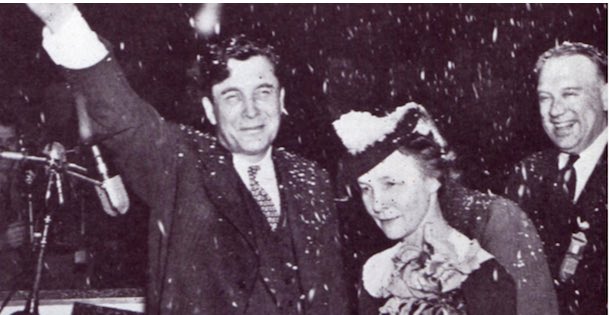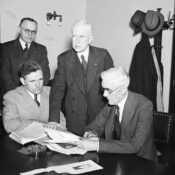Anticipating fireworks at next week’s Republican convention? Think it’s going to be a huge shift from staid politics of the past now that Trump is leading the charge?
Turns out, those supposedly sober Republicans have a pretty raucous history. At the 1912 convention, barbed wire was secretly rigged under the bunting around the stage, presumably to keep Teddy Roosevelt’s rabble at bay. And, sure enough, TR stormed out of that one to hold a renegade convention a few weeks later. At that event, one of his Rough Riders was observed drunkenly walking the floor with guns drawn.
While there was no violence at the 1940 Republican convention, it is, to this day, considered one of the most dramatic of all time. Wendell Willke — like Donald Trump, a Democrat for many years, and also a businessman who had never held office — came out of left field to grab the nomination. He arrived with a committed delegate count of precisely zero. Through his attacks on FDR and his opposition to the isolationist policies of Republican leaders, he slowly gained ground and was nominated after an astounding six rounds of balloting. (He received only 10 percent of the vote in the first round.)
So, while it may be counterintuitive, Republican conventioneers have historically been a wild bunch, as the following report from the Post archive attests:
Who Said Republicans are Respectable?
By Beverly Smith
Excerpted from an article originally published on June 19, 1948It is commonly said that Republican conventions are more decorous, cut and dried, and businesslike than the Democratic assemblies. Possibly this is true on average, but don’t bet on it. When did the Democrats ever see an amateur — a former member of the opposite party at that — barge into one of their conventions and, by a combination of personality, popular appeal, publicity, and high pressure, take the whole show right away from the professionals? Willkie did that at the Republican Convention of 1940.
Did the Democrats ever stage a convention so tense with fears of violence that the platform railings, beneath their gay bunting, were strung with barbed wire to stop a possible charge of armed men? No, that was the Republican Convention of 1912. It was at that same 1912 convention, by the way, that the Taft members of the Georgia delegation were shut up in a hospital until the voting began, to protect them against the blandishments of Teddy Roosevelt missionaries.
But surely, it may be argued, the famous convention of 1860, which nominated Lincoln, was a dignified affair? That was the impression I gathered in school: a picture of a group of solemn and dedicated men, assembling in the shadow of civil war to choose their man of destiny. It wasn’t that way. The contemporary documents show that the Republican Convention of 1860 in Chicago was a wild, woolly, convivial, confused, and unpredictable affair, which might not have nominated Lincoln at all except for a lucky blunder of the convention clerks. For the benefit of any who may still think that those antebellum Republican delegates were a lot of grave, superannuated old tintypes, consider the following report from the convention, May 18, 1860, by a brilliant young reporter for the Cincinnati Commercial, Murat Halstead: “I do not wish to convey the impression that drunkenness prevails here to an extent very unusual in National Conventions,” he wrote, “For that would be doing an injustice. I do not feel competent to state the precise proportions of those who are drunk, and those who are sober. There are large numbers of both classes.”
On the first ballot on Friday, Seward got 173 ½ votes — far fewer than expected. Lincoln was second with 102, with Cameron, Chase, and Bates trailing. On the second ballot, Seward was 184 ½; Lincoln had moved up to 181. On the third ballot, Lincoln was 231 ½ — just a vote and a half from a majority. Then Cartter, of Ohio, a big man with bristling black hair, a pock-marked face, and a stammer, jumped up to announce the shift of four Ohio votes to Lincoln. The victory howl broke loose. A man on the roof at the skylight gave the signal to a battery of artillery in the street.
“The thunder of the salute rose above the din,” wrote Halstead, “and the shouting was repeated with such tremendous fury that some discharges of the cannon were absolutely not heard by those on the stage. Puffs of smoke drifting by the open doors, and the smell of gunpowder, told what was going on.”
Conventions frequently make history, but they seldom know what kind of history they are making. The Republican Convention of 1900, for example, thought its main job was the renomination of President McKinley. It made its history, absent-mindedly, just before leaving for home, when it nominated a vice president — the reluctant Theodore Roosevelt. Teddy tried to block the move, but once his name came before the convention, the enthusiasm was so great that he could not reject the nomination without hurting his party standing. McKinley was assassinated in September of 1901, and Theodore Roosevelt began his famous presidential career.
Now about those barbed-wire entanglements of 1912: The regular Republican convention of that year was held in the Chicago Coliseum. The defeated T.R. and his followers walked out and founded the Progressive, or Bull Moose, Party. A few weeks later they staged their own convention, to nominate T.R., in the same hall. In preparation for this second shindig, Teddy’s supporters went to the Coliseum to redecorate it. When they removed the earlier convention bunting from the platform, they were astounded to find the railings strung with barbed wire. “I was hopping mad,” wrote one of the supporters.
At T.R.’s convention, an observer described a half-drunken Rough Rider brandishing two six-guns and vowing to kill anyone who opposed the Colonel. One popular rumor was that Teddy planned to mount a white horse, lead a cavalry charge down the aisles, and reenact the battle of San Juan Hill. While this event did not come to pass, Teddy did whip his followers to a frenzy with his famous cry: “We stand at Armageddon, and we battle for the Lord!”
Hearing this, a wild crowd of T.R. rooters in the park across Michigan Avenue jumped up and down like maniacs for two solid hours in rain and deep mud, yelling, “We want Teddy!”
In 1940, many considered Wendell Willkie a Johnny-come-lately amateur, an ex-Democrat who was “damn near a Socialist.” As the 1940 gathering got rolling and Willkie’s surprising strength began to build up, Senator Jim Watson tried desperately to stem the tide. He got the Bob Taft and Tom Dewey forces into a room and pleaded with them to compromise and join their strength. But the old smoking process didn’t work. Neither man would step down. Finally Jim gave up and stalked glumly out into the corridor, where he ran smack into Willkie. Here is Watson’s version of what they said:
WILLKIE: Jim, couldn’t you be for me?
WATSON: No, Wendell. You’re just not my kind of a Republican.
WILLKIE: I admit I used to be a Democrat.
WATSON (with a snort): Used to be?
WILLKIE: You’re a good Methodist. Don’t you believe in conversion?
WATSON: Yes, Wendell. If a fancy woman truly repented and wanted to join my church, I’d welcome her. I would greet her personally and lead her up the aisle to a front pew. But — by the Eternal! — I wouldn’t ask her to lead the choir.
WILLKIE (turning on his heel): Aw, Jim, you just go to hell.Old Jim won that one on points, but Willkie had the last word as the balloting proceeded. With the galleries chanting “We want Willkie!”; with a blizzard of pro-Willkie telegrams blowing in from all over the country; with most of the press [including The Saturday Evening Post], the columnists, and the radio commentators cheering for him — Willkie swept on to victory.
It was a fascinating performance, because it violated so many of the axioms. Cynical old-timers cherish the belief that all conventions are run and manipulated by a few powerful insiders; that the delegates are mere puppets; that the demonstrations are purely synthetic; that the screaming of the galleries is meaningless; and that public opinion is irrelevant.
In some conventions this is true. In others it just isn’t.
Become a Saturday Evening Post member and enjoy unlimited access. Subscribe now



